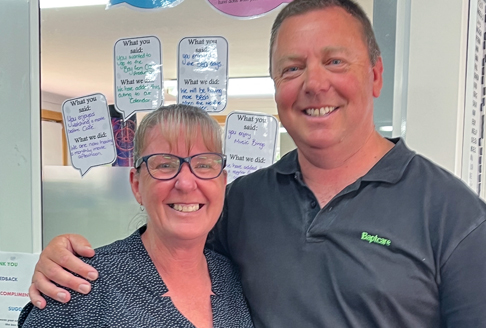We sat down with Sharon and Paul Beckett, Care Assistants at Baptcare’s Orana aged care community in Tasmania, to talk about working (and laughing) together as spouses, Orana life and their recent renewal of vows – by an Orana resident, no less! It’s no surprise that they refer to Orana as their second family. But first some words from their manager, Robyn Jones.
Robyn, what would you like to say about Sharon and Paul?
I have never met a husband and wife who work so well together and can bounce off each other so easily.
We say Paul is our MP of Orana. He is funny, always happy and seems to get away with things much easier than any other staff member because the clients love him so much. I regularly receive these types of comments from clients: “Orana would never be the same without Paul”. “The day Paul leaves will be a very sad day for Orana.”
But I should note something. You may have heard three of our customers on Paul’s recent video saying that Paul is the best? This was because Paul told them to say this! He is always asking for a show of hands from our clients “Who is the best?” and coaches them to answer, “Paul is the best!”.
Sharon is the person who clients can talk to about anything, and she is very trusted. When Sharon says she will follow up something for them they know that she will. Sharon has taken clients on bus trips over the years, and the clients always comment that they were in great hands with her. Sharon takes her responsibilities in ensuring client safety very seriously.
Sharon and Paul have taken clients on weekends away twice and they are asking for another weekend away to the East Coast. This is very important to our clients as they can’t go away on weekends on their own, so it’s very special for them that Orana can provide this opportunity.
And now, let’s hear from Sharon and Paul.
What are your roles and how long have you been working at Baptcare?
Paul: I have been with Baptcare for approximately six years. I work in the activities centre five days a week. I assist in serving meals and make sure all the customers are engaged in the afternoon activities. I also facilitate the overnight trips. I make sure that the customers leave feeling better than they did when they arrive.
Sharon: I have been with Baptcare for six and a half years. I started in the Overnight Respite before moving into the activity coordinator role, then out to the community where I provided support for Domestic Assistance (DA), Personal Care (PC) and Social Support Individual (SSI). I have also worked side by side with Paul in the Social Centre. I’ve been in my current role of Intake and Assessment coordinator for approximately 18 months and I love it!
What do you like about working at Baptcare Orana?
Paul: I enjoy interacting with customers and bantering with them. They never know what they are going to get from day to day. I also like being able to work in the same facility as Sharon.
Sharon: I enjoy working at Orana as I get to get up every morning knowing that I get to walk through the door and start my day in a job I love. I also love working under the same roof as Paul.
What are three words that best describe you?
Paul: Funny, outgoing, entertaining.
Sharon: Caring, honest, hardworking.
What did you want to be when growing up?
Paul: Policeman
Sharon: Hairdresser
Pet Peeve?
Paul: Being interrupted mid conversation.
Sharon: When people are late and don’t apologise.
First Job?
Paul: Carpet factory worker.
Sharon: Supermarket cashier.
Ideal holiday destination:
Paul and Sharon: Alaska!
Fun fact many people may not know about you?
Paul: I’ve been a covert surveillance investigator for over 7 years. (Editor: such a perfect example of Paul’s sense of humour at work! Thanks Paul!).
Sharon: I studied classical ballet as a child/teenager and received many high distinctions.
We heard that you had your wedding vows renewed to celebrate your 30-year anniversary and that a client, Ted Nobbs, ran the service? (Photo below to be included)
We renewed our vows on our 30th wedding anniversary in 2022. Ted is a special customer at Orana and the day wouldn’t have been the same without him. We were also lucky to have our two adult children and Paul’s mum and stepfather there with us. Ted was a minister in his younger years. He very kindly wrote our vows, said a few words and presented us with a lovely certificate.
Have you got any tips for a successful marriage?
Paul: Apologise every morning before doing anything.
Sharon: Always talk about things no matter how small or big they are.
We don’t want to rock the happy relationship boat but who are your celebrity crushes?
Paul: Keira Knightley.
Sharon: Hugh Jackman (And he’s now single! )
Favourite Quote?
Paul: People say exercise never hurt anyone but why risk it?
Sharon: Be yourself, everyone else is taken.
What are the best and worst things about working together as husband and wife at Baptcare?
Paul and Sharon: best thing: we are always together being able to support and bounce off each other in the workplace.
Sharon: worst thing: I don’t think there is one. We have worked together in other jobs throughout our working life and I just enjoy having Paul by my side.
Paul: worst thing: Customers always take Sharon’s side during banter and never mine.
Thank you, Paul and Sharon, for your fun and caring hearts. We appreciate all that you do daily to make Orana such a special place to be.
Community news
-

Back to School Tips for Foster and Kinship Carers
Heading back to school can be exciting, but it can also bring up big feelings—especially for kids in care. Here are a few simple ways to help make the transition smoother.
- 17 Apr 2025
-

Easter Reflection from Emily Booth of our Spiritual Care Team
A few years ago, at Easter, I was staying with my sister and her family for the weekend. One afternoon we were all sitting around chatting and the kids were playing when my sister came into the room and placed a tray of fresh, warm hot cross buns on the table
- 16 Apr 2025
-

Student Volunteer Spotlight - Erin
Did you know that Baptcare has student volunteers at some of our Residential Aged Care communities? Our volunteers are an integral part of our Baptcare community, not only in residential aged care but across many of our programs and services. Volunteers provide essential connection, positivity and assistance to residents, clients and consumers.
- 04 Apr 2025

